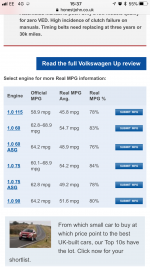That is just your opinion, but you are not the only one who thinks that way. Therefore legislation has been changed. Next month we'll see the WLTP results of all cars. These are supposed to be more representative than the NEDC results we are discussing about right now.
I literally have no idea what you’re actually talking about.
It is not ‘my opinion’ that the tests are supposed to be representative, there would be absolutely no point in doing the tests if it wasn’t to get an idea of what the likely fuel economy of the car would be even if the goal is to decide on tax banding, the need an idea of the likely figures on the car. It seems somewhere up above I pointed out that your opinion about something is not a fact or data and you seem to be trying to turn that around on me, and in the process you’re not making any logical sense.
There was some data, the data comes from some sort of scientific process, but your opinion was the data wasn’t right, but with little understanding of how the data was gathered, I suggested you go and do your own research if you wanted to know how real world mpg figures are gathered a 1. I could not be bother to explain it, to (2) someone who clearly wouldn’t listen as you’re sticking to your opinion and no amount of reasoned argument would change that.
So just to make it absolutely clear. The whole point in mpg and Co2 figures is to get a general idea of the expected figures that you would get, it is not my opinion that is literally their only purpose.
You might be super happy that fiat fiddled the tests so you didn’t have to pay as much in tax when the car was brand new, however for many people this isn’t a consideration because most people don’t buy new cars. You might not car that the fuel cost is a lot higher than it should have been as per the quoted figures, but for a lot of people the cost of buying the car and paying the initial tax gets swallowed up in their monthly PCP payments, were as having to pay £100 a month in fuel when they only budgeted for £60 a month is a big difference and could very easily make the difference between someone can afford the car or not.
If someone buys a TA sold to them as the more efficient car, but their budget can’t stretch to the unanticipated fuel costs, suddenly they can’t afford to service it or pay for repairs, the 1.2 can probably tolerate longer service intervals without too much bother, as it’s a very simple and robust engine, the TA on the other hand does not like being neglected and could well fail prematurely as a result. Not because the owner was tight or absent minded, but because Fiat promised something that simply wasn’t achievable.


